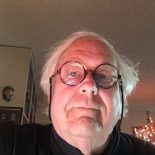Simanaitis Says
On cars, old, new and future; science & technology; vintage airplanes, computer flight simulation of them; Sherlockiana; our English language; travel; and other stuff
DIALECTS, EVEN ACROSS A CLEVELAND STREET
WIKIPEDIA HELPED IN THE RECENT Berkeley item by noting that this British car name is pronounced/ˈbɑːrkliː/, “Barkly.” A link to “Help: IPA/English” got me thinking about George Bernard Shaw’s saying (or maybe he said) in 1942, “England and America are two countries separated by the same language.”

Patricia T. O’Conner and Stewart Kellerman write in The New York Times, “Stiff Upper Lips: Why Can’t the British Be More Like Us?” “What we do know is that Oscar Wilde said the same thing in different words in 1887: ‘We have really everything in common with America nowadays, except, of course, language.’ ”
Whatever its source, this truism is exhibited in the Berkeley sports car, London’s Berkeley Square, and The University of California, Berkeley. Also, in the Brit’s “gerl” and our “gurl” when both of us mean “girl.”


Locally Too. A Cleveland kid was asked, “When did you come to this country, Dennis?” when he said “Buffalo is about three ares drive from here.” It wasn’t until he worked as a volunteer at WBOE, the city’s pioneer educational radio station, that a gentle director there taught him the difference between “are” and “hour.”
Here are other dialectical tidbits from Wikipedia’s description of the International Phonetic Alphabet.

Consonants Versus Vowels. English language consonants tend to have unique sounds, the “b” is a “b,” pure and simple. There are IPA exceptions, though.
The Letter L. IPA’s two “l” consonants, l as in lie, ply, and gal, and lj as in lute, have a good story told by Peter Coke (pronounced, by the way, “Cook”), the radio voice of Brit sleuth Paul Temple.
A director was repeatedly cautioning Coke to say the word “lute” correctly, until a colleague whispered in his ear, “He wants you to say it ‘lewt.” In IPA lingo, lj.
A World’s Cup Locale. I’m reminded too of the recent uncertainty in the pronunciation of Qatar. Is it “Cutter” or “CutTAR”? An Arabic language expert on BBC noted that the q sound has a unique Arabic rendering that’s all but impossible for non-native speakers to recognize, let along reproduce. See “When Did You Come to this Country, Dennis?” for more on the importance of a baby’s learning.
Vowels. English vowel sounds have lots of variations; some, indeed, that I don’t hear. As an example, here are two “strong” vowels: There’s “ɒ,” as in “lot” or “bother.” And there’s “ɔː,” as in “thought” or “naught.”
Do you hear a difference?
“Caught Sleeping on a Cot.” The Wikipedia IPA article notes, “Many speakers of American and Canadian English pronounce cot /ˈkɒt/ and caught /ˈkɔːt/ the same. You may simply ignore the difference between the symbols /ɒ/ and /ɔː/, just as you ignore the distinction between the written vowels o and au when pronouncing them.”
“The Nurse is in a Hurry.” Says Wikipedia, “In rhotic North American English there is no distinction between the vowels in nurse /ˈnɜːrs/ and letter /ˈlɛtər/. If you speak such a dialect, read /ɜːr/ as /ər/. The /ʌr/ of hurry often joins this neutralization; if you have it in your speech, read /ɜːr/, /ər/ and /ʌr/ as /ər/.”
By the way, “rhotic” speakers of English pronounce r everywhere it is written. Non-rhotics soften the r essentially out of existence. “Pahk the cah in Hahvahd Yahd.”
I could find no IPA reference to “Are Country, ’Tis of Thee.” ds
© Dennis Simanaitis, SimanaitisSays.com, 2023

I’ve noticed that non-rhotic speakers do not so much omit the r as displace it: “I pahked my cah neeyah the hahdwayah stoah. My idear was to buy a new sawr for my chest of drahs prahject.”
Yes. I believe I’ve heard that when I lived in Worcester (pronounced, by the way, “Wustah,” or something near that).
Aside from all the dialects in the UK and America / Canada, there are also those in Australia, New Zealand, South Africa and many other countries where English is spoken often as a second language with accents impacted by the native language.
…”A nightingale sang in Barkly Square” … yes, that’s how it’s supposed to be pronounced.
And, growing up, there were in fact distinct (to local ears) dialects from the major districts in San Francisco.